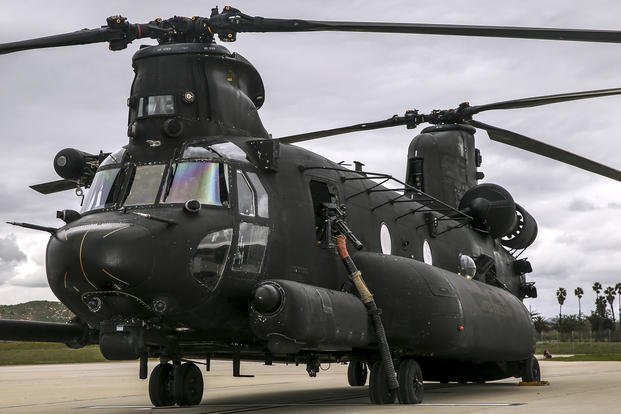The 160th Special Operations Aviation Regiment's mission is to organize, equip, train, resource and employ Army special operations aviation forces worldwide in support of contingency missions and combatant commanders. Known as Night Stalkers, these soldiers are recognized for their proficiency in nighttime operations. They are highly trained and ready to accomplish the very toughest missions in all environments, anywhere in the world, day or night, with unparalleled precision. They employ highly modified Chinook, Black Hawk, and assault and attack configurations of Little Bird helicopters.
Soldiers of the 160th have been engaged actively and continuously in the combat operations since October 2001. Today, the 160th Special Operations Aviation Regiment continues a sustained and active forward presence in the U.S. Central Command area of operations at multiple locations in support of operations Enduring Freedom. Our crews also provide support to U.S. Southern, Pacific, Africa and European commands.
Organization
The 160th SOAR(A) is comprised of a regiment headquarters, four battalions and a dedicated training company. The regiment headquarters is located with the 1st and 2nd battalions and the Special Operations Aviation Training Battalion at Fort Campbell, Kentucky; 3rd Battalion is located at Hunter Army Airfield, Georgia; and 4th Battalion is located at Joint Base Lewis-McChord, Washington. This strategic organizational structure postures the regiment to support special operations forces mission and training requirements well into the future.
Each battalion also has a strategic composition of light, medium and heavy helicopters, all highly modified in design to meet the unit's unique mission requirements. Regiment reorganization modifying the 160th fleet composition was approved in October 2007 and will be implemented over the next several years. Currently, 1st Battalion has one AH-6 Little Bird helicopter company, one MH-6 Little Bird helicopter company and three companies of MH-60 Black Hawk helicopters; 2nd Battalion has two MH-47 Chinook helicopter companies; and 3rd and 4th battalions each have two MH-47 Chinook helicopter companies and one MH-60 Black Hawk helicopter company. Each battalion also has a Headquarters and Headquarters Company and a maintenance company.
Assessment, Selection and Training
The 160th SOAR actively seeks and assesses the best-qualified aviators, crew members and support personnel in the Army. Members of this unit are three-time volunteers: for the Army, airborne training and the regiment. Upon selection, commissioned and warrant officers and enlisted soldiers complete respective basic mission qualification courses, known as Green Platoon, which are facilitated by the Special Operations Aviation Training Company.
The professionalism and capabilities of Army special operations aviation are developed through a "train as you fight" mentality. Rigorous training continues upon assignment to the line units. The regiment is exceptionally resourced for extensive and realistic training that is conducted regularly in a variety of environments. This extensive, realistic training is the foundation of unit combat readiness.
History
Originally created as Task Force 160, the unit was formed from soldiers of the 101st Airborne Division at Fort Campbell, Kentucky. In October 1981, the unit was officially designated the 160th Aviation Battalion. The regiment then became an airborne unit in October 1986 and was redesignated the 160th Special Operations Aviation Group (Airborne). The modern-day 160th Special Operations Aviation Regiment (Airborne) was activated officially in June 1990. Most recently, in July 2006, the regiment provisionally stood up a fourth battalion to meet growing special operations forces requirements.
Soldiers of the 160th pioneered the Army's nighttime flying techniques. The unit became known as the "Night Stalkers" because of its capability to strike undetected during the hours of darkness and its unprecedented combat successes. Today, Night Stalkers continue to develop and employ new technology and tactics, techniques and procedures for the battlefield. Time and again, in every major combat operation since Grenada, soldiers of this unit demonstrate that they live by their motto, "Night Stalkers Don't Quit."
Want to Know More About the Military?
Be sure to get the latest news about the U.S. military, as well as critical info about how to join and all the benefits of service. Subscribe to Military.com and receive customized updates delivered straight to your inbox.











